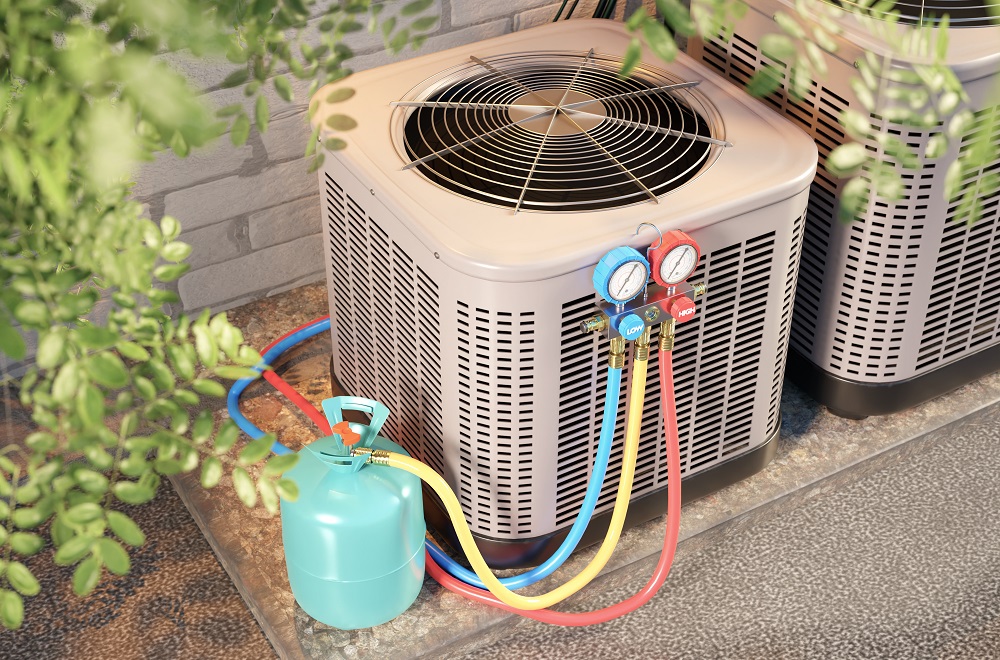Should You Be Concerned About the New Refrigerant in HVAC Systems?
Blog Post - Sep 23, 2025
Introduction
The HVAC industry is going through one of its biggest changes in years: the transition to new refrigerants. If you’ve been hearing about “new refrigerant rules” or wondering how this might affect your home or business, you’re not alone. Many homeowners are asking whether they should be concerned about this shift.
The short answer: No need to panic, but it’s smart to stay informed.
Why Refrigerants Are Changing
For decades, HVAC systems relied on refrigerants like R-22 and later R-410A. These chemicals made cooling and heating possible, but they came with environmental drawbacks. R-22 was phased out because it harmed the ozone layer, and now R-410A is being replaced because of its high Global Warming Potential (GWP).
The Environmental Protection Agency (EPA) and global regulations are now pushing for newer refrigerants with lower environmental impact, such as R-32 and R-454B. These alternatives are designed to be more eco-friendly and efficient.
What This Means for Homeowners
The transition may raise a few questions for homeowners and business owners:
• Do I need a new system immediately? No. If your current HVAC system is working fine and uses R-410A, you don’t need to replace it right away. Parts and refrigerant will remain available for service for years.
• Will repairs get more expensive? Eventually, yes. As the supply of R-410A declines, costs for refrigerant-related repairs could rise over time.
• Are the new systems better? Yes. Units designed for the new refrigerants tend to run more efficiently, which can save on energy bills while reducing environmental impact.
• Should I delay installing the new system? Not necessarily. If you need a replacement now, current systems are available for installation.
Safety and Performance Considerations
Some homeowners worry about the flammability of certain new refrigerants. While it’s true that refrigerants like R-32 are mildly flammable, HVAC manufacturers are engineering equipment with strict safeguards and standards to ensure safe operation.
Performance-wise, the new refrigerants are equal to or even more efficient than R-410A. That means you’re not sacrificing comfort for sustainability.
The Bottom Line
The refrigerant transition is a big change for the industry, but not something most homeowners should worry about day-to-day. Your current HVAC system will continue working, and when the time comes to replace it, you’ll simply be moving into a more environmentally friendly, energy-efficient solution.
If you’re considering a new HVAC system or have questions about servicing your current one, our team is here to help you navigate the options and choose what’s best for your home and budget.
Blog post written by AI & Edited/Approved by Tradewinds HVAC and Fireplace
The HVAC industry is going through one of its biggest changes in years: the transition to new refrigerants. If you’ve been hearing about “new refrigerant rules” or wondering how this might affect your home or business, you’re not alone. Many homeowners are asking whether they should be concerned about this shift.
The short answer: No need to panic, but it’s smart to stay informed.
Why Refrigerants Are Changing
For decades, HVAC systems relied on refrigerants like R-22 and later R-410A. These chemicals made cooling and heating possible, but they came with environmental drawbacks. R-22 was phased out because it harmed the ozone layer, and now R-410A is being replaced because of its high Global Warming Potential (GWP).
The Environmental Protection Agency (EPA) and global regulations are now pushing for newer refrigerants with lower environmental impact, such as R-32 and R-454B. These alternatives are designed to be more eco-friendly and efficient.
What This Means for Homeowners
The transition may raise a few questions for homeowners and business owners:
• Do I need a new system immediately? No. If your current HVAC system is working fine and uses R-410A, you don’t need to replace it right away. Parts and refrigerant will remain available for service for years.
• Will repairs get more expensive? Eventually, yes. As the supply of R-410A declines, costs for refrigerant-related repairs could rise over time.
• Are the new systems better? Yes. Units designed for the new refrigerants tend to run more efficiently, which can save on energy bills while reducing environmental impact.
• Should I delay installing the new system? Not necessarily. If you need a replacement now, current systems are available for installation.
Safety and Performance Considerations
Some homeowners worry about the flammability of certain new refrigerants. While it’s true that refrigerants like R-32 are mildly flammable, HVAC manufacturers are engineering equipment with strict safeguards and standards to ensure safe operation.
Performance-wise, the new refrigerants are equal to or even more efficient than R-410A. That means you’re not sacrificing comfort for sustainability.
The Bottom Line
The refrigerant transition is a big change for the industry, but not something most homeowners should worry about day-to-day. Your current HVAC system will continue working, and when the time comes to replace it, you’ll simply be moving into a more environmentally friendly, energy-efficient solution.
If you’re considering a new HVAC system or have questions about servicing your current one, our team is here to help you navigate the options and choose what’s best for your home and budget.
Blog post written by AI & Edited/Approved by Tradewinds HVAC and Fireplace

- Blog
- Should You Be Concerned About the New Refrigerant in HVAC Systems?
- August HVAC & Fireplace Checklist
- How to beat the heat
- Top 5 Benefits of Financing a New AC or Furnace
- Top Reasons You Need AC Tune Up Services
- Spring Home Maintenance Tips
- Spring HVAC Maintenance
- The Importance of Fireplace Maintenance
- The Importance of a Secondary Source of Heat
- Which Type of Fireplace Is Best?
- Reasons Why WiFi Thermostats Are Better for Your Home
- How Does an Ionizer Work to Help Fresh Air via HVAC? - Tradewinds HVAC Blog
- Best Ways to Prepare Your Home for Winter
- Benefits of HVAC maintenance
- Ideas to Keep Your Home Cool
- How to keep your home comfortable in the summer
- Essential AC Spring Maintenance Checklist
